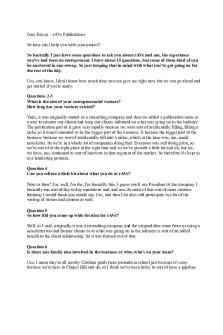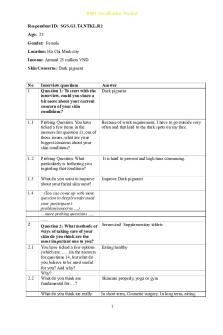LATROBE MGT1OBE Transcript Video 9 2020 PDF

| Title | LATROBE MGT1OBE Transcript Video 9 2020 |
|---|---|
| Course | working with others |
| Institution | La Trobe University |
| Pages | 3 |
| File Size | 62.2 KB |
| File Type | |
| Total Downloads | 13 |
| Total Views | 138 |
Summary
LATROBE MGT1OBE Transcript Video 9 2020.LATROBE MGT1OBE Transcript Video 9 2020.LATROBE MGT1OBE Transcript Video 9 2020.LATROBE MGT1OBE Transcript Video 9 2020....
Description
About This Document (IRD-41857). This Microsoft Word document created by the La Trobe University Inclusive Resources Development team. This document has been created as a transcript of the supplied audio/video and contains only narrative/spoken content. No audio description has been included. While every care has been taken to accurately transcribe the original material there may still be errors contained in this conversion.
Project Number. 41857. Student Name. Digital Learning Strategy. Reading Information Supplied. Video 9.2 Subject Code. MGT2OBE - ORGANISATIONAL BEHAVIOUR. Article Title. Video 9.2. Publication. MGT2OBE. Publisher. La Trobe University. Date of publication. 2016. Copyright Notice. Copyright Regulations 1969. WARNING. This material has been copied and communicated to you by or on behalf of La Trobe University pursuant to Part VA of the Copyright Act 1968 (the Act). The material in this communication may be subject to copyright under the Act. Any further copying or communication of this material by you may be the subject of copyright protection under the Act. Do not remove this notice.
Start Transcript.
Dr Jennifer Spore Hi and welcome to organisational behaviour. I'm Dr Jennifer Spore. In this video we'll explore the meaning of leadership and assess two of the early perspectives on leadership. Leadership is the process of influencing, motivating and enabling others to contribute towards the effectiveness of organisations of which they are members. It is a special type of interpersonal influence that gets an individual or group to do what the leader wants. It is all about using appropriate interpersonal styles and methods in guiding individuals and groups towards accomplishing tasks. Leadership takes two broad forms. Formal leadership is the process of exercising influence from a position of formal authority in an organisation. Informal leadership is the process of exercising influence through special skills or resources that meet the needs of other people. For example shared leadership is the view that leadership is broadly distributed rather than assigned to one person. From this view employees are leaders when they champion change in the company or team. A common question is whether managers are also leaders. Leaders inspire, create opportunities, coach and motivate people to gain support. Leaders usually create an organisation's mission and develop the strategy to achieve that mission. Managers make things happen and keep work on schedule. They engage in routine interactions to fulfil planned actions. Managers implement the mission. Put simply managers see and solve problems whereas leaders see possibilities to overcome these by going around them. But in practice most managers are expected to be leaders or to play some leadership role as well. The earliest research and theorising in leadership theory start to identify a set of general traits such as intelligence, charisma, integrity, even height, that are related to success in leadership roles. The idea is that once these traits were identified they could be used to select leaders. These early studies focused on great people or leaders from history to try to understand what differentiated these people from the masses and what separated leaders from non-leaders and effective leaders from less effective leaders. However due to inadequate theorising, measurement issues and a lack of attention to contextual factors the trait or competency perspective failed to identify a unique set of traits or competencies that clearly and consistently differentiated leaders from non-leaders. However this early work did lay the groundwork for considering certain traits in combination with other leadership aspects such as behaviours that formed the basis for some of the more current theories of leadership. Leadership research then shifted to examining the behaviour and actions of effective leaders. One common distinction that emerged is the team task oriented and people or relationship oriented behaviours. Task oriented behaviours, also sometimes called initiating structure, give followers structure in terms of how to accomplish tasks. Examples include assigning tasks and organising activities. Relationship oriented behaviours, also sometimes called consideration, focus on providing support and encouragement. Examples include encouraging communication, establishing rapport and participative leadership. The early research concluded that leaders should be high on both taskand relationship-oriented behaviours. Another distinction of leadership behaviours is autocratic, democratic and laissez-faire leadership. Autocratic leaders are highly controlling and directive. They make decisions on their own, and their decisions might even seem arbitrary. Democratic leaders involve followers in decisions and tend to create a more egalitarian environment. Laissez-faire leaders aren't really leaders at all; they essentially don't do much of anything unless something goes terribly wrong. The research on these leadership styles and behaviours found that on the whole the democratic leaders had more productive workers than autocratic or laissez-faire leaders.
It is important to note that much of the early research on leadership was conducted with white male leaders in western cultures. However whether different leadership styles would be effective and accepted depends on many factors including the gender of the leader and the cultural context. For example research on gender and leadership has demonstrated that women tend to use participative or democratic leadership styles more frequently compared to more autocratic and directive styles. Furthermore women are expected to use a democratic or participative leadership style and women who use an autocratic style are penalised and evaluated more negatively compared to male leaders who are similarly autocratic. Women also tend to engage in more relationship oriented behaviours compared to men. Again women are also stereotyped and expected to be more relationship focused so they are penalised and evaluated negatively if they are not relationship oriented. Research also shows that participative and democratic leadership is increasingly preferred in individualistic and low powered eastern countries such as Australia and the United States. However in more collectivistic and high powered eastern cultures it may be more acceptable and expected to be directive. This is the end of the video. I'm Dr Jennifer Spore and thanks for listening. End Transcript....
Similar Free PDFs

Transcript for Video Home
- 18 Pages

Transcript
- 2 Pages

Transcript 2
- 3 Pages

SGS transcript
- 3 Pages

Interview transcript
- 7 Pages

Practica 9-2020-2021
- 3 Pages

N4685M1 transcript
- 7 Pages
Popular Institutions
- Tinajero National High School - Annex
- Politeknik Caltex Riau
- Yokohama City University
- SGT University
- University of Al-Qadisiyah
- Divine Word College of Vigan
- Techniek College Rotterdam
- Universidade de Santiago
- Universiti Teknologi MARA Cawangan Johor Kampus Pasir Gudang
- Poltekkes Kemenkes Yogyakarta
- Baguio City National High School
- Colegio san marcos
- preparatoria uno
- Centro de Bachillerato Tecnológico Industrial y de Servicios No. 107
- Dalian Maritime University
- Quang Trung Secondary School
- Colegio Tecnológico en Informática
- Corporación Regional de Educación Superior
- Grupo CEDVA
- Dar Al Uloom University
- Centro de Estudios Preuniversitarios de la Universidad Nacional de Ingeniería
- 上智大学
- Aakash International School, Nuna Majara
- San Felipe Neri Catholic School
- Kang Chiao International School - New Taipei City
- Misamis Occidental National High School
- Institución Educativa Escuela Normal Juan Ladrilleros
- Kolehiyo ng Pantukan
- Batanes State College
- Instituto Continental
- Sekolah Menengah Kejuruan Kesehatan Kaltara (Tarakan)
- Colegio de La Inmaculada Concepcion - Cebu








